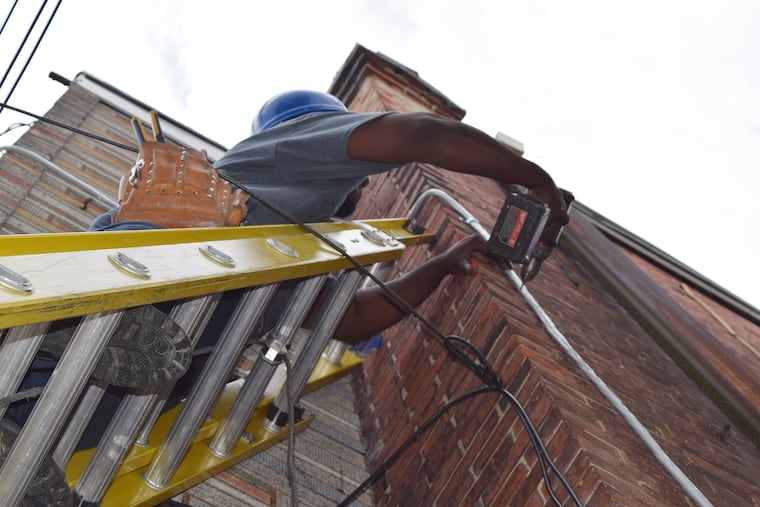Philly’s violence crisis can be reduced by tackling our housing repair crisis | Editorial
Philadelphia’s gun violence, charting a record pace for homicides this year, presents a difficult and deadly problem. But recent research points to a solution that could save lives.

Philadelphia’s gun violence, charting a record pace for homicides this year, presents a difficult and deadly problem. But recent research points to a solution that could save lives while making housing more equitable in the city.
The city’s Basic Systems Repair Program, funded by a combination of tax dollars and money from the Housing Trust Fund that also receives fees from developers, has helped residents afford needed roofing, plumbing, and electrical repairs for their homes for over forty years. A recent study from researchers at the University of Pennsylvania reported that the benefits of this program extend beyond individual home repairs to whole neighborhoods. That’s because the historically segregated blocks analyzed benefiting from Basic Systems Repair work saw a reduction in violence of 21.9%. The more interventions a block saw, the more violence was reduced.
With the city set to spend tens of millions of dollars on anti-gun violence initiatives, which in the past have received and spent millions of dollars without oversight or accountability, it is worth investing and studying more to fight the structural and environmental causes of violence through a measure with so far demonstrated success.
» READ MORE: Home repair grants linked to decreased crime
Barren neighborhoods with dirty streets and desolate green spaces are alienating and can make residents feel unvalued. In some parts of the city, young men don’t even bother venturing outside or making friends for fear of encountering street violence and getting ensnared by the criminal-legal system.
The experiences of these primarily Black and Latino men show how Philadelphia has operated as two distinct cities. One Philadelphia, sold to tourists and entrepreneurs, is a dynamic city filled with beautiful parks, excellent restaurants, and legions of college-educated young people moving here. The other contends with violence, blight, and broken schools. Private investment floods to the first Philadelphia, while the second sees the continuation of the disinvestment and abandonment that have segregated the city since midcentury redlining and through the Rizzo era.
For those in the second city, the emergence of the first can spark confusion and anxiety. Confusion because the Philadelphia they live in, with a record number of murders concentrated largely in neighborhoods within North, South, and Southwest Philadelphia, has a disconnect from the glossy Philadelphia added to the 2021 Condé Nast Gold List for tourism. Anxiety from the fear that if their neighborhood manages to get more resources, they won’t be able to stick around for the stronger schools and safer streets that come with it. Such fears drive opposition to new development and other quality-of-life improvements because of the assumption that gentrification and displacement will follow.
But the Basic Systems Repairs program shows a route to addressing both concerns at once, by making these neighborhoods safer and more livable all around for current residents. Additional research from Eugenia South, one of the study’s authors, suggests that clean streets and pleasant community spaces also contribute to lower rates of violence, especially by reducing stress.
To some, these changes may echo Broken Windows policing theories — but this isn’t about policing anyone’s behaviors. It is about instead investing in neighborhoods, communities, and people, and lifting them up.
» READ MORE: Gun Violence in Philly is an emergency | Opinion
This Basic Systems Repair program faced the threat of cuts from the city last year but ultimately maintained funding levels. As Philly continues to put more stock in evidence-based programs, this one deserves a funding increase and continued evaluation.
Expanding these efforts will have the further benefit of showing that quality-of-life initiatives do not have to come with gentrification. Routing this investment through targeted changes like home improvements, and funding them through initiatives such as the developer-fed Housing Trust Fund, boosts not high-income neighborhoods like Fishtown and Graduate Hospital but the communities that need it most. It can help make neighborhoods more resilient, protect homes from blight, and empower homeowners to stay. As South told WHYY: “If Black Lives Matter, we have to invest in Black neighborhoods, and that is not a small investment. That is a large investment to make up for decades and decades of disinvestment.”
The research shows this investment can also save lives. City Council should continue supporting the Housing Trust Fund with general fund dollars, while seeking more avenues to encourage developers to pay into the fund. This money, alongside continued evaluations of our nonprofit antiviolence programs, can help ensure Philadelphia’s “second city” is getting the resources it has long deserved.